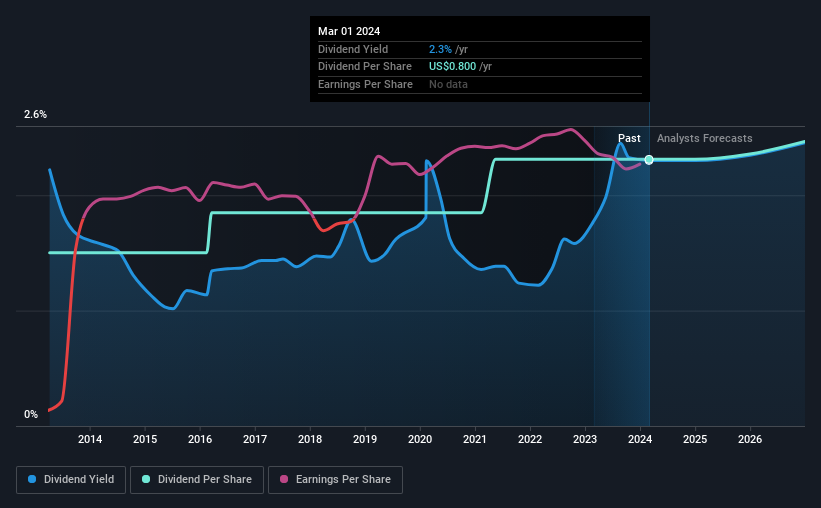Sealed Air Corporation (NYSE:SEE) Looks Like A Good Stock, And It's Going Ex-Dividend Soon
Sealed Air Corporation (NYSE:SEE) stock is about to trade ex-dividend in 4 days. Typically, the ex-dividend date is one business day before the record date which is the date on which a company determines the shareholders eligible to receive a dividend. The ex-dividend date is of consequence because whenever a stock is bought or sold, the trade takes at least two business day to settle. This means that investors who purchase Sealed Air's shares on or after the 7th of March will not receive the dividend, which will be paid on the 22nd of March.
The company's next dividend payment will be US$0.20 per share. Last year, in total, the company distributed US$0.80 to shareholders. Last year's total dividend payments show that Sealed Air has a trailing yield of 2.3% on the current share price of US$34.76. Dividends are a major contributor to investment returns for long term holders, but only if the dividend continues to be paid. As a result, readers should always check whether Sealed Air has been able to grow its dividends, or if the dividend might be cut.
See our latest analysis for Sealed Air
If a company pays out more in dividends than it earned, then the dividend might become unsustainable - hardly an ideal situation. That's why it's good to see Sealed Air paying out a modest 34% of its earnings. Yet cash flow is typically more important than profit for assessing dividend sustainability, so we should always check if the company generated enough cash to afford its dividend. Thankfully its dividend payments took up just 43% of the free cash flow it generated, which is a comfortable payout ratio.
It's positive to see that Sealed Air's dividend is covered by both profits and cash flow, since this is generally a sign that the dividend is sustainable, and a lower payout ratio usually suggests a greater margin of safety before the dividend gets cut.
Click here to see the company's payout ratio, plus analyst estimates of its future dividends.
Have Earnings And Dividends Been Growing?
Businesses with strong growth prospects usually make the best dividend payers, because it's easier to grow dividends when earnings per share are improving. If business enters a downturn and the dividend is cut, the company could see its value fall precipitously. That's why it's comforting to see Sealed Air's earnings have been skyrocketing, up 20% per annum for the past five years. Sealed Air is paying out less than half its earnings and cash flow, while simultaneously growing earnings per share at a rapid clip. This is a very favourable combination that can often lead to the dividend multiplying over the long term, if earnings grow and the company pays out a higher percentage of its earnings.
Many investors will assess a company's dividend performance by evaluating how much the dividend payments have changed over time. In the last 10 years, Sealed Air has lifted its dividend by approximately 4.4% a year on average. Earnings per share have been growing much quicker than dividends, potentially because Sealed Air is keeping back more of its profits to grow the business.
To Sum It Up
Should investors buy Sealed Air for the upcoming dividend? Sealed Air has been growing earnings at a rapid rate, and has a conservatively low payout ratio, implying that it is reinvesting heavily in its business; a sterling combination. It's a promising combination that should mark this company worthy of closer attention.
On that note, you'll want to research what risks Sealed Air is facing. For example, Sealed Air has 2 warning signs (and 1 which makes us a bit uncomfortable) we think you should know about.
If you're in the market for strong dividend payers, we recommend checking our selection of top dividend stocks.
Have feedback on this article? Concerned about the content? Get in touch with us directly. Alternatively, email editorial-team (at) simplywallst.com.
This article by Simply Wall St is general in nature. We provide commentary based on historical data and analyst forecasts only using an unbiased methodology and our articles are not intended to be financial advice. It does not constitute a recommendation to buy or sell any stock, and does not take account of your objectives, or your financial situation. We aim to bring you long-term focused analysis driven by fundamental data. Note that our analysis may not factor in the latest price-sensitive company announcements or qualitative material. Simply Wall St has no position in any stocks mentioned.

